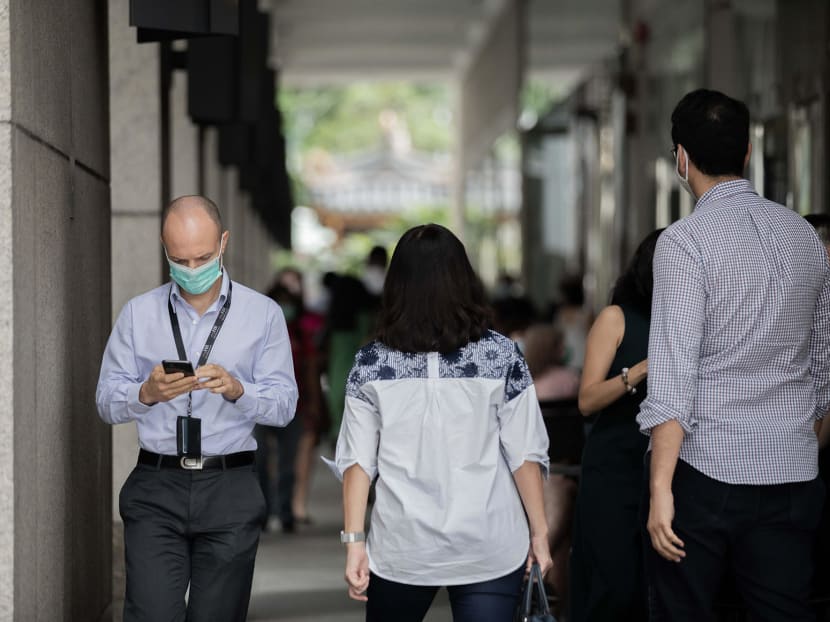Review of EP scheme to create more diverse workforce, better assess qualifications of applicants: Tan See Leng
SINGAPORE — Beyond imposing salary requirements, the Government is looking at how to inject more diversity into the workforce and better assess the qualifications of Employment Pass (EP) holders as part of its review of the EP framework.

The Government is looking at how to inject more diversity into the workforce and better assess the qualifications of Employment Pass applicants.
- Manpower Minister Tan See Leng said it would be “very difficult” to impose quotas on Employment Pass holders based on nationality
- He said that his ministry would ensure anti-discrimination policies become a “core pillar” of the Tripartite Alliance for Fair and Progressive Employment Practices
- But anti-discrimination laws would not be a panacea
SINGAPORE — Beyond imposing salary requirements, the Government is looking at how to inject more diversity into the workforce and better assess the qualifications of Employment Pass (EP) holders as part of its review of the EP framework.
At a media interview on Saturday (July 10), Manpower Minister Tan See Leng said that the Government relies on salary as a requirement now because it is easy and relatively transparent.
He was speaking to reporters at Joo Chiat Community Club four days after a protracted debate in Parliament on the Comprehensive Economic Cooperation Agreement between Singapore and India, the role of trade deals, and the approach taken by Singapore.
Dr Tan said: “The next few measures that we are looking to tighten will be also looking into the consideration of the talent skill sets that are required.”
He said that the Government would examine the diversity of the workforce in sectors that need a lot of foreign workers, as part of a move to refine the EP scheme, first revealed in a debate on the Ministry of Manpower’s (MOM) budget in March.
EPs allow foreign professionals, managers and executives to work in Singapore.
They must earn at least S$4,500 a month and hold qualifications such as professional credentials, specialised skills or good university degrees.
Dr Tan, who took over as manpower minister in May, said that MOM hopes not to see a concentration of workers from a certain source or nationality.
“From the perspective of this Covid-19 pandemic, one of the painful lessons we have learnt is that if you overly rely on one particular country, whether it is labour or for your talent, and if something happens and you get disruption, then you are going to be in a much more difficult position,” he said.
Dr Tan was asked if the Government was considering imposing quotas on EP holders based on nationality.
In response, he said that he does not believe in quotas and that this would be “very difficult” to impose.
He described himself as a firm believer in the free market, adding: “If you look at how our open-door policy has benefited us through the decades, it is to try to not be too prescriptive about how businesses should be run.
“There has to be a huge element of the free market.”
The Government would intervene when businesses are in danger of being monopolistic or too narrow in their focus.
“But, other than that, I think we should let businesses run,” he said.
Aside from ensuring workforce diversity, the Government is also mulling over better ways to assess the qualifications of EP holders, in terms of where they are derived and their criteria.
Dr Tan said that the review would cover more areas and details would be announced later.
Last year, the minimum qualifying salary for EP holders was raised twice, first from S$3,600 to S$3,900 on May 1, and then from S$3,900 to S$4,500 on Sept 1.
For firms in the financial services sector, there was a further increase to S$5,000 from Dec 1 last year.
FIGHTING WORKPLACE DISCRIMINATION
On Saturday, Dr Tan was also asked if MOM would consider anti-discrimination policies under the Tripartite Alliance for Fair and Progressive Employment Practices (Tafep), which handles employment disputes.
He said that the authorities were indeed looking at ways to ensure that such policies would be a “core pillar” of Tafep, as part of a review.
Former Manpower Minister Josephine Teo, who is now communications and information minister, wrote on Facebook that since last year, some Members of Parliament (MPs) had spoken to her extensively about the possibility of legislative changes to provide Tafep with more support to ensure fairness at workplaces.
“I shared these views with See Leng and am glad he’s kept it on his radar,” said Mrs Teo.
Leader of the Opposition Pritam Singh, speaking on Thursday at an event organised by the Singapore International Chamber of Commerce, called on companies to consider lobbying the Government to pass anti-discrimination laws, which he said would not affect the majority of employers with progressive human resource policies.
Mrs Teo added: “Mr Singh’s call for legislative change, therefore, has a ring of familiarity to it.”
When asked whether anti-discrimination laws would be put in place — a similar call made by other MPs in the past — Dr Tan said that he does not think legislation would be the cure-all: “Everything, let’s just legislate — I don't think that will be the panacea.”
He added that an overly prescriptive approach might risk pushing businesses overseas, with Singapore losing out in the long run.
The review of Tafep is under way and it would “not be long” before the recommendations become available, he said.
RESPONSE TO FINANCIAL TIMES REPORT
On Friday, the Financial Times (FT) reported that expatriates in Singapore were fed up over strict travel curbs that locked some of them out of the country.
Others expressed frustration over travel constraints and vaccine priority as well as fears over jobs, said the British newspaper, with some foreign professionals moving out of the city-state.
Asked about the dissonance between the Government’s stance that Singapore must stay open and the fact that some expats are feeling unwelcome, Dr Tan said that he read news articles such as the FT's with “a lot of concern”.
He said that what the FT team did not put out was that Singapore was in the midst of a public health crisis.
“One of the things that (they) didn't realise is that even if we had opened the doors, do you think that the freedom of travel is so easily mounted?” he asked.
“The fact is that every country has its restrictions.”
Dr Tan noted that more infectious variants of the coronavirus have been detected here after the easing of restrictions.
“So the only thing we can do is that we, quietly, without a lot of fanfare, aggressively wrap up vaccination to try to achieve herd immunity and protect our people as soon as possible.”








